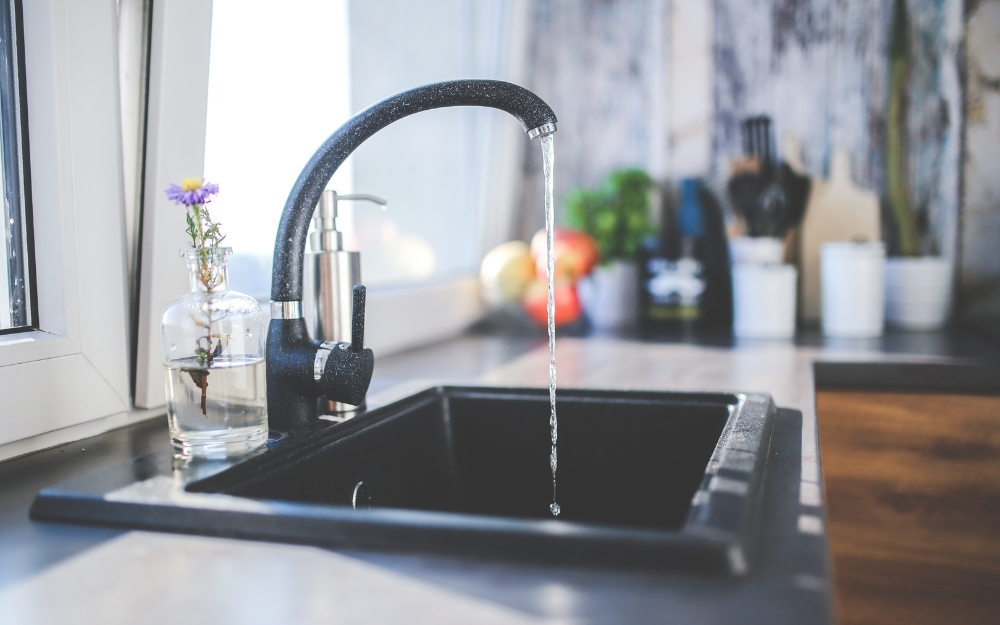A black kitchen sink can add a sleek and modern touch to your culinary space. However, maintaining its elegance requires proper care and cleaning. This comprehensive guide will walk you through the steps and techniques to effectively clean and maintain a black kitchen sink, ensuring it remains sparkling and hygienic for years to come.
Understanding Your Black Kitchen Sink
Black sinks are typically made from various materials like granite composite, stainless steel with a black finish, or even porcelain enamel. Moreover, each material requires specific care or cleaning techniques to preserve its appearance and functionality while avoiding damage or discoloration during cleaning. For example, cleaning composite granite sink differs from cleaning a marble sink.
How Do Kitchen Sinks Accumulate Dirt?
- Daily Use: Constant exposure to food debris, soap residue, water spots, and oils from cooking can accumulate in the sink, leading to stains and buildup over time.
- Hard Water Deposits: Mineral deposits from hard water can leave unsightly marks and require more effort to clean, especially on a darker sink surface.
- Improper Cleaning: Using harsh or abrasive cleaners, neglecting regular cleaning routines, or leaving stains unattended can contribute to dirt buildup.
Supplies You’ll Need for Cleaning Black Kitchen Sink
Gather the following supplies before you start cleaning your black kitchen sink:
- Mild dish soap
- Baking soda
- Vinegar
- Soft sponge or cloth
- Microfiber towel
- Non-abrasive cleaning solution (optional)
- Mineral oil or specialized sink protectant (if applicable)
Step-by-Step Process on How to Clean Black Kitchen Sink
Follow these steps on cleaning your black kitchen sink:
1. Daily Maintenance
- Rinse the sink thoroughly after each use to prevent the buildup of food particles or stains.
- Wipe the sink with a soft cloth or sponge to remove any remaining residue.
2. Weekly Cleaning
Create a paste using baking soda and water. Furthermore, apply it to the sink’s surface and gently scrub in circular motions with a soft sponge or cloth. Rinse thoroughly.
3. Stubborn Stains
- For tougher stains or mineral deposits, dampen a cloth or sponge with vinegar and gently scrub the affected area. In addition to it, rinse thoroughly afterward.
- If needed, use a non-abrasive cleaner specifically designed for black sinks. Furthermore, follow the manufacturer’s instructions for best results.
4. Final Polishing
If applicable, some black sink materials benefit from occasional oiling to maintain their shine. Furthermore, apply a small amount of mineral oil to a microfiber cloth and rub it onto the sink’s surface. Wipe off any excess oil with a clean cloth.
Precautions and Additional Tips
- Stay away from abrasive cleaners, bleach, or ammonia-based products that can damage the sink’s finish.
- Before using any new cleaning solution, test it in an inconspicuous area to ensure it won’t cause discoloration or damage.
- Make it a habit to clean your sink regularly to prevent buildup and maintain its appearance.
Preventive Measures for Long-Term Maintenance
- Place sink protectors or mats at the bottom of the sink to prevent scratches from pots, pans, or utensils.
- Be cautious with substances like coffee grounds, strong dyes, or acidic foods that can potentially stain the sink.
Do’s and Don’ts When Cleaning
Do’s
- Opt for mild dish soap, baking soda and vinegar for regular cleaning. These are effective yet gentle on the sink’s surface, preventing damage or discoloration.
- After cleaning, ensure you rinse the sink thoroughly with water to remove any remaining cleaning solution or residue.
- Use soft sponges, cloths, or non-abrasive scrubbers to clean your sink. Avoid abrasive pads or harsh brushes that may scratch the surface.
Don’ts
- Avoid using abrasive cleaners, bleach, or ammonia-based products, as they can scratch or dull the finish of your black sink.
- Try to clean up stains or spills promptly to prevent them from setting into the sink’s surface and becoming harder to remove.
- Avoid leaving metal pots, pans, or utensils in the sink for extended periods, as they may cause scratches or damage.
Cleaning a black kitchen sink doesn’t have to be a daunting task, this should be included on your kitchen deep cleaning. With the right cleaning techniques and regular maintenance, you can keep your sink looking pristine and hygienic. Remember to use gentle, non-abrasive solutions and avoid harsh chemicals to preserve the sink’s elegance while ensuring it remains a centerpiece of your kitchen for years to come.
Maintain your black kitchen sink’s allure with these simple cleaning steps and care tips, ensuring a gleaming and stylish addition to your culinary space. Furthermore, incorporate these practices into your routine, and revel in the radiance of your beautifully maintained sink every day!





























